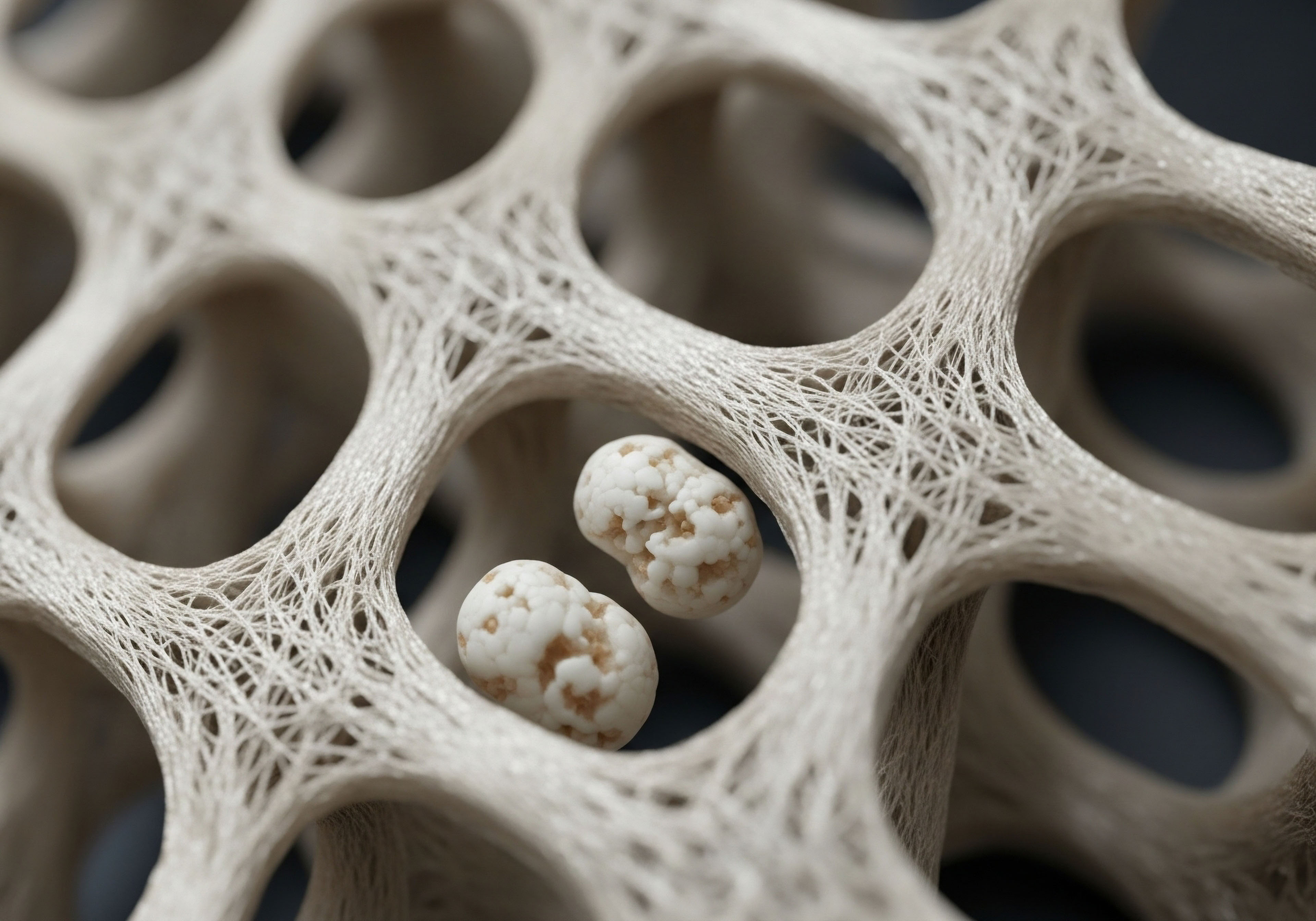

Fundamentals of Endocrine Immune Crosstalk
The subtle shifts within your body, manifesting as persistent fatigue, unexplained mood fluctuations, or a general decline in resilience, are often more than isolated events. These sensations signal a deeper dialogue occurring between your internal systems, a conversation where hormonal messages significantly influence your immunological state. Recognizing this intrinsic connection represents the first step toward understanding your personal biological symphony and reclaiming a vibrant state of being.
Hormonal balance serves as a profound conductor for numerous physiological processes, including the intricate operations of the immune system. The endocrine system, through its vast network of glands and secreted messengers, directly communicates with immune cells, shaping their development, function, and overall responsiveness. When this delicate equilibrium is disrupted, the immune system often reflects this imbalance, potentially leading to altered inflammatory responses or compromised immune surveillance.
Hormonal shifts profoundly influence immune system function, directly affecting cellular responsiveness and overall physiological balance.

How Hormones Shape Immune Responses
Consider hormones as the body’s master communicators, delivering precise instructions to cells throughout the entire organism. Immune cells, equipped with specific receptors for various hormones, actively interpret these signals. For instance, the adrenal glands’ output, cortisol, significantly modulates inflammatory pathways, while sex steroids like testosterone and estrogens exert considerable influence over immune cell differentiation and cytokine production. A consistent hormonal environment allows the immune system to maintain its protective functions with optimal efficiency.
When the production of these vital biochemical agents deviates from optimal ranges, whether due to age, stress, or other factors, the immune system’s operational parameters adjust accordingly. This recalibration can manifest as a heightened propensity for chronic, low-grade inflammation, a diminished capacity to defend against pathogens, or an altered response to environmental stressors. Understanding these foundational principles empowers individuals to connect their lived experiences with the underlying biological realities.


Hormonal Optimization Protocols and Immune Modulation
For individuals experiencing symptoms consistent with suboptimal hormonal levels, carefully designed hormonal optimization protocols represent a strategic intervention aimed at restoring systemic equilibrium. These protocols, often referred to as hormonal replacement therapy (HRT) or endocrine system support, extend their influence far beyond reproductive function, deeply impacting the immune system’s operational capacity and long-term resilience. The precise recalibration of circulating hormone levels can significantly alter immunological landscapes.
The objective of these interventions centers on bringing specific hormone levels back into a physiological range, thereby signaling to the body’s cells, including those of the immune system, that optimal conditions prevail. This biochemical recalibration can lead to a more balanced immune response, potentially mitigating the chronic inflammatory states frequently associated with hormonal decline.
Targeted hormonal interventions aim to restore physiological balance, thereby influencing immune function and potentially reducing chronic inflammation.

Testosterone’s Immunomodulatory Role
Testosterone, a primary androgen, plays a multifaceted role in immune regulation for both men and women. In men, appropriate testosterone replacement therapy (TRT) protocols, often involving weekly intramuscular injections of Testosterone Cypionate, can positively influence immune cell populations. Gonadorelin, administered subcutaneously, helps maintain testicular function and endogenous testosterone production, further contributing to systemic balance. Anastrozole, used judiciously, manages estrogen conversion, preventing potential immune dysregulation linked to excessive estrogen.
In women, lower-dose testosterone cypionate, typically via subcutaneous injection or pellet therapy, can similarly support immune health. This hormonal agent influences cytokine profiles and T-cell activity, contributing to a more robust and balanced immune response. Progesterone, particularly relevant for pre-menopausal, peri-menopausal, and post-menopausal women, also exhibits distinct immunomodulatory properties, often promoting an anti-inflammatory state and supporting immune tolerance.
Consider the direct actions of specific hormones on key immune components:
- Testosterone ∞ Influences the differentiation of T-cells, potentially reducing pro-inflammatory cytokines while supporting regulatory T-cell function.
- Estrogens ∞ Can exhibit both pro-inflammatory and anti-inflammatory effects depending on concentration and receptor type, influencing antibody production and autoimmune disease susceptibility.
- Progesterone ∞ Often acts as an anti-inflammatory agent, particularly important in maintaining immune tolerance during pregnancy, and plays a role in dampening immune overactivity.

How Does Hormone Replacement Therapy Affect Inflammatory Markers?
The administration of specific hormonal agents can lead to measurable changes in systemic inflammatory markers. For instance, restoring optimal testosterone levels in hypogonadal men has been associated with reductions in C-reactive protein (CRP) and other indicators of chronic inflammation.
Similarly, balanced estrogen and progesterone regimens in women can help modulate the immune system, potentially lowering the risk of inflammatory conditions. These biochemical adjustments signify a fundamental shift in the body’s internal environment, promoting a state more conducive to overall wellness.
| Hormone | Primary Immune Actions | Potential Long-Term Implications |
|---|---|---|
| Testosterone | Modulates T-cell activity, reduces pro-inflammatory cytokines, supports immune surveillance. | Decreased chronic inflammation, enhanced pathogen response, improved cellular repair. |
| Estrogens | Influences antibody production, impacts autoimmune responses, alters cytokine balance. | Variable effects on autoimmune risk, supports mucosal immunity, modulates inflammation. |
| Progesterone | Promotes anti-inflammatory responses, supports immune tolerance, modulates immune cell proliferation. | Reduced systemic inflammation, improved immune homeostasis, enhanced tissue healing. |


Molecular Intersections of Endocrine Systems and Immunosenescence
The long-term immunological implications of endocrine system support protocols extend to the very foundations of cellular resilience and the trajectory of immunosenescence, the age-related decline in immune function. A deeper appreciation of these interactions requires delving into the molecular intricacies governing hormone-receptor interactions and their downstream effects on gene expression within immune cells. This perspective allows for a more profound understanding of how biochemical recalibration influences not merely symptomatic relief, but fundamental biological aging processes.
Sex steroid hormones, including androgens and estrogens, exert their immunomodulatory effects through a complex interplay of genomic and non-genomic mechanisms. Genomic actions involve the binding of hormones to intracellular receptors, which then translocate to the nucleus to regulate gene transcription, thereby altering the production of immune-related proteins and cytokines.
Non-genomic actions occur rapidly, often at the cell membrane, influencing intracellular signaling cascades that modulate immune cell activation and function. This dual modality of action underscores the pervasive influence of these molecules on immune cell fate and activity.
Hormone replacement influences immunosenescence through genomic and non-genomic pathways, impacting gene expression and cellular signaling within immune cells.

Androgen Receptor Signaling in Immune Homeostasis
The androgen receptor (AR), expressed on various immune cells including T-lymphocytes, B-lymphocytes, and macrophages, mediates the effects of testosterone. Sustained optimal testosterone levels, as achieved through appropriate TRT, can modulate the balance between Th1 and Th2 immune responses, typically shifting towards a more balanced profile that mitigates excessive inflammation.
Furthermore, testosterone influences the development and function of regulatory T cells (Tregs), which are critical for maintaining immune tolerance and preventing autoimmunity. The long-term implications involve a potential reduction in chronic inflammatory burden and a more robust, yet controlled, immune surveillance system.
The precise impact of testosterone on the immune system also involves its aromatization to estradiol within certain tissues. This localized conversion adds another layer of complexity, as estrogens also possess significant immunomodulatory capabilities. Understanding these local conversions and the subsequent receptor binding dynamics is essential for appreciating the holistic impact of androgen optimization on immunological health.

Estrogen Receptor Subtypes and Immune Cell Function
Estrogens, acting through estrogen receptor alpha (ERα) and estrogen receptor beta (ERβ), profoundly influence both innate and adaptive immunity. ERα activation often promotes pro-inflammatory responses and enhances humoral immunity, while ERβ activation frequently exerts anti-inflammatory and immunosuppressive effects. The relative expression of these receptor subtypes on different immune cell populations, coupled with the circulating levels of various estrogenic compounds, dictates the overall immunological outcome.
In the context of female hormonal optimization, maintaining a balanced estrogen profile, often alongside progesterone, can contribute to immune system stability. Dysregulation of estrogen signaling, such as seen in states of estrogen dominance or deficiency, can predispose individuals to altered immune responses, including an increased susceptibility to certain autoimmune conditions or impaired responses to infection. The long-term support of these endocrine pathways therefore holds significant promise for mitigating immune-related pathologies.

Can Hormone Replacement Therapy Influence Autoimmune Disease Risk?
The intricate connection between sex hormones and autoimmune diseases is a significant area of academic inquiry. Many autoimmune conditions exhibit a clear sex bias, with a higher prevalence in women, suggesting a direct role for sex steroids in disease pathogenesis.
Hormone replacement protocols, by re-establishing physiological hormone levels, may modulate the immunological milieu in ways that influence autoimmune disease risk or progression. For example, some studies indicate that balanced estrogen and progesterone levels could contribute to immune tolerance, potentially lessening the severity or incidence of certain autoimmune phenomena.
Conversely, the impact of TRT on autoimmune conditions in men requires careful consideration, as testosterone can have both suppressive and enhancing effects on different immune pathways. The nuanced understanding of these interactions, informed by personalized diagnostic approaches, is paramount for guiding clinical decisions.
| Pathway/Mechanism | Androgen Influence | Estrogen/Progesterone Influence | Long-Term Outcome |
|---|---|---|---|
| Cytokine Production | Decreased IL-6, TNF-α; increased IL-10. | Variable, often increased IL-6, TNF-α; progesterone increases IL-10. | Reduced chronic systemic inflammation, balanced immune signaling. |
| T-cell Differentiation | Favors Th1/Treg balance; influences CD4/CD8 ratios. | Impacts Th17, Th2 responses; affects T-cell activation. | Enhanced immune tolerance, improved adaptive response efficacy. |
| B-cell Activity | Generally suppressive of B-cell proliferation and antibody production. | Can enhance B-cell activity and antibody production, particularly autoantibodies. | Modulated humoral immunity, potentially influencing autoimmune risk. |
| Natural Killer Cells | Enhances NK cell cytotoxic activity. | Variable effects, often context-dependent. | Improved immune surveillance against viral infections and malignancies. |

References
- Muller, J. M. & Naumann, R. (2018). Endocrine-Immune Interactions ∞ A Comprehensive Review. Academic Press.
- Verma, A. & Singh, R. (2020). Sex Hormones and Immune Function ∞ Mechanisms and Clinical Implications. Springer Nature.
- Straub, R. H. (2007). The Endocrine System in Inflammatory Rheumatic Diseases. Springer.
- Kanda, N. & Tamaki, K. (2006). Estrogen and the immune system. Journal of Dermatology Science, 40(1), 1-14.
- Mohamad, N. V. et al. (2019). A review of testosterone and its effect on the immune system. Clinical and Experimental Medicine, 19(1), 5-11.
- Cutolo, M. et al. (2018). Sex hormones and immune function in autoimmune rheumatic diseases. Nature Reviews Rheumatology, 14(11), 633-644.
- Morrow, M. & Smith, J. M. (2015). Hormonal Regulation of Immune Responses. Elsevier.
- Griffin, J. E. & Ojeda, S. R. (2000). Textbook of Endocrine Physiology. Oxford University Press.

Reflection
Understanding the intricate dance between your endocrine and immune systems offers a profound opportunity for personal insight. This knowledge serves as a compass, guiding you toward a more informed and proactive approach to your health. Your biological systems are dynamic, constantly adapting, and recognizing their interconnectedness empowers you to make choices that resonate with your deepest physiological needs.
Consider this exploration a foundational step, a recognition that a personalized path to vitality necessitates a deep, personalized understanding of your unique biological blueprint.



